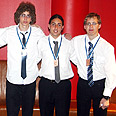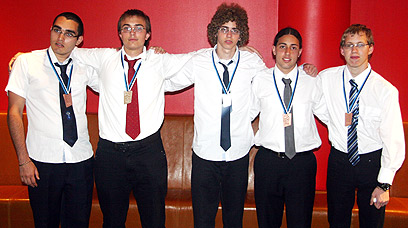
Silver and bronze
Israelis bring home medals – from physics Olympiad
Physics team brings home two silver, three bronze medals from 43rd International Physics Olympiad in Estonia; drop 12 places in rankings
While Israel's athletes are failing to make an impression at the London 2012 Olympic Games, Israel's physics team, which took part in the 43rd International Physics Olympiad in Estonia, had better luck with two silver medals and three bronze medals.
The talented physicists are Itai Cna'an Harpaz from Haifa and Itai Rubinstein from Misgav who won the silver medals. Chen Solomon from Kfar Yona, Yigal Zegelman from Maccabim-Reut and Eden Segal from Jerusalem were awarded the bronze medals.
Some 400 students from 81 countries participated in this year's Olympiad. Leading the rankings are the teams from east Asia (China, South Korea, Taiwan and Thailand.) Israel was ranked in 25th place this year – dropping 12 spots compared to last year, when its team took home two gold medals and three bronze.

The winning Olympiads
Nevertheless, this year's team still beat the teams from Britain, Australia and Canada in spite of the absence of its star and last year's gold medalist, Gal Dor, who did not participate in this year's competition after the Israeli delegation decided to give other students a chance to experience the Olympiad.
Dr. Eli Raz, the head of the Physics Department at Ort Braude College noted that the top-ranking teams are professional teams and demand that the students abandon everything but their physics studies.
"As far as we're concerned, the Olympiad is a tool to encourage the love and pursuit of physics and not the goal itself. That's why I think it isn't right to demand that the students be forced to study physics at a professional level as teenagers.
"It could cause them to loath (physics) as is so often the case with the Chinese team members who walk away from the field as soon as the competition is over," Raz explained.
Raz added: "Last year's achievement was rare but this year the Israeli team invested a great deal of effort and brought Israel a great deal of honor on an international level."
The Israeli physics team is picked by the Technion. Only five team members are selected from a pool of 2,800 candidates after undergoing six screening stages.










